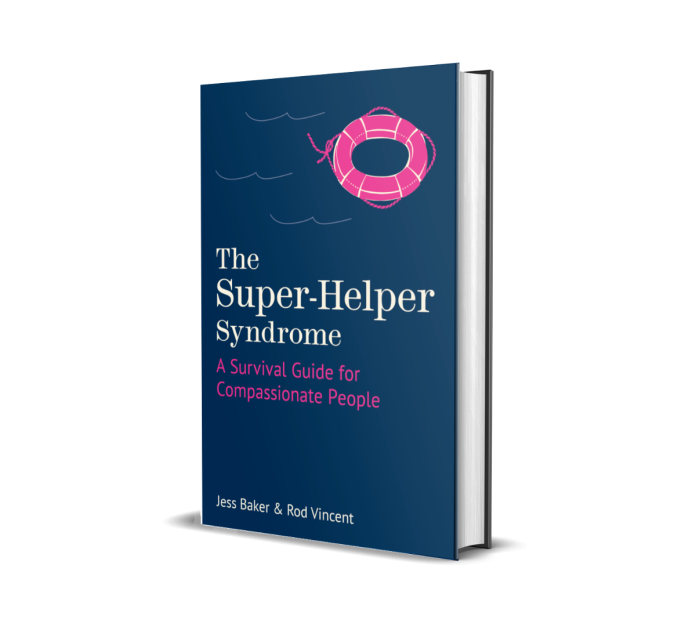Humans love to help. It’s in our DNA, but what happens when our urge to help others takes over. This new book, based on studying the psychology of helpers, is here to help the helpers
Chartered Psychologists Jess Baker & Rod Vincent studied the psychology of helpers — what motivates them and why sometimes they struggle. The Super-Helper Syndrome is their new comprehensive tool kit to improve the lives of those who improve the lives of others.
Why this book matters now
- For the many who are suffering exhaustion from #SuperHelperSyndrome
- For the frontline of super-helpers in crisis – nurses, carers, teachers, managers, shop workers, lawyers, support staff – whose #SuperHelperSyndrome is leading to the detriment of their own wellbeing
- It is time to improve the lives of those who improve the lives of others, to support the super-helpers in our lives – now more than ever, we need them to be okay, be they our colleagues, employees, family members or friends.
- NHS absentee rates are at record levels, with stress accounting for over 30% of sickness absence
- 1.3 million ‘sandwich carers’ are left without resources, with more than 1 in 4 suffering from depression and anxiety
‘This book is a powerful catalyst in showing helpers how to help themselves. I loved the prompts bringing deep insight, expertly yet tenderly unpicking the core beliefs that keep us stuck in unhealthy helping habits, followed up with the practical tools to actually do things differently. This book is a game changer’
– Suzy Reading, Psychologist and Author
Super-helpers are better at helping others than they are at looking after themselves. Maybe you’re one of them. Maybe you know someone who is. They are the backbone of the caring professions, giving strength to our schools, clinics, care homes and hospitals. You will also find them in offices, gyms, community groups and charities – everywhere you look — and there’s usually one in every family.
But in their efforts to help wherever they can, Super-helpers typically overstretch themselves. Some face traumatic and distressing situations. In long-term caring relationships they have no time to care for themselves. In professional care roles, they work prolonged hours with inadequate resources.
Deep down, beneath all their care for others, there is something that causes helpers to suffer. It lurks unnoticed. It dwells in the psychology of the helper and compels them to help others to the extent that they don’t look after their own needs. This is super-helper syndrome. Until recently this phenomenon has gone unnoticed and unnamed, but now it has been highlighted by two chartered psychologists, Jess Baker and Rod Vincent.
The Super-Helper Syndrome offers:
New perspective on the psychology of helping
- Sets out how helping works and why it sometimes goes wrong.
- Brings to life psychological and neuroscientific research to explain the roots of compassion and empathy.
- Goes deep into the belief system of helpers and reveals what really motivates them.
- Illustrates all this by drawing on a broad spectrum of interviews with paid and unpaid helpers, from ICU nurses to lawyers, volunteers to live-in carers.
Practical tools
- Activities for the reader to profile and analyse their own helping relationships.
- Support for adopting a Healthy Helper Mindset, including meeting their own needs, building assertiveness and setting helping boundaries.
- Guidance on countering the inner critic, with mindful self-compassion.
- Only by doing these things can compassionate people be most effective at helping others.
Content and topics
The authors are chartered psychologists and experts in wellbeing at work, helping clients tackle the imposter syndrome, build mental resilience, and become more self-compassionate. They are available for comment, interview and to write by-lined articles on a range of topics, including:
- Super-helper Syndrome: Can’t stop helping EVERYONE? Here’s how to survive.
- Exhausted of being the agony aunt, the family fixer, the mediator? Find out how to look after yourself too.
- Humans are natural helpers – why is it in our DNA?
- How compassionate do you think you are?
- Does always helping make people dependent? Avoiding the pitfalls.
- The single biggest mistake people make when trying to help
- Turn off your brain from critical thoughts and rename your inner critic
- How to be a healthy and hardy helper
- The 4 irrational beliefs of The Super-Helper Syndrome
- Self-Care – learn to breathe in self-compassion and take care of yourself
- What does it mean to be a good person? The psychology behind it
Exclusive articles and interviews available
The Super-Helper Syndrome – A Survival Guide for Compassionate People is published in hardback by Flint Books on 29th September 2022, RRP £18.99.
About the authors:
Jess Baker is a Chartered Psychologist. She started her career in clinical and research psychology in the NHS, and later moved into leadership roles in the corporate sector and consulting. She comments in the press on leadership and psychology. As an expert on the wellbeing of helpers she offers her services on a voluntary basis to charities.
Rod Vincent is a Chartered Psychologist, a writer and a musician. His poems and stories have been published in literary journals including Poetry Ireland Review, Stand and The Rialto. He writes the lyrics and plays bass as one half of O’Reilly & Vincent.

